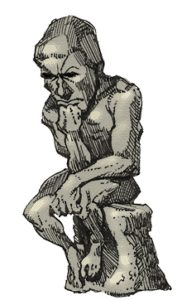“The storytelling monkeys”—that’s an expression my partner Jim has used for years to describe what distinguishes humans from other animals. I always thought it was a clever turn of phrase, but I didn’t understand the profound importance of that idea until I read Sapiens by Yuval Harari. The book showed up on the favorites list of a lot of smart and famous people, including Bill Gates, Barack Obama and Mark Zuckerberg. The subtitle—A Brief History of Humankind—gives you a sense of its subject and scope, but what really sells it for me is the premise, which I would articulate in three words: story is everything.
Here’s the logic: Seventy thousand years ago, homo sapiens was one of half a dozen species of hominids living quietly on the Earth, organized into tribes or extended families that usually numbered no more than 70 or 80 individuals. What distinguished us from the Neanderthals and other, now extinct, proto-humans was not the size of our brain or the strength of our muscles or any unique capacity for making tools. What distinguished us was our imagination. It was our imagination that opened the door to shared fictions—stories—which made it possible for vastly larger groups of people to cooperate. Whether you are talking about the supernatural powers of jealous gods, the divine right of hereditary kings, the inalienability of human rights or the value of paper money, without such stories the largest group of individuals that can cooperate in a flexible way is around 70 or 80. Story—the shared belief in fictions that have no physical reality—makes it possible to coordinate the activity of almost unlimited numbers. Consider for example the virtually universal belief in the value of American dollars that underpins the global financial system.
The hypothesis is that the human mind evolved to facilitate imagination and shared belief because that skill gives humans an extraordinary evolutionary advantage. As Harari pointed out in his TED talk, an average human would not fair very well against an average Neanderthal, or even against an average chimpanzee. Even 80 humans would probably be defeated by an equal number of Neanderthals or chimps. But once thousands of humans could cooperate in a flexible and intentional way, there was nothing on Earth that could stop them.
I think this hypothesis is fascinating all by itself, but it is also deeply relevant to marketing in particular, and to human enterprise in general. Think about it this way: The mind is optimized to support shared beliefs that facilitate massive and flexible cooperation. In fact, in the general run of human affairs the amount of decision making that is based solely on a rational calculation of costs and benefits is vanishingly small. The brain processes virtually all incoming information in the context of stories. If you want to connect with other people, whether as a marketer, a politician, an adversary or a friend, you have to do and say things that provide clues that support a story they already have playing in their heads. And ideally, the way you act in the world will demonstrate that you share a belief in that story with them.
Most of the time, in most areas of our lives, we do all this storytelling intuitively. If you are involved in a group storytelling process, however, like a TV series, a political campaign or a brand-building initiative, it is very difficult to harness the full power of story unless you can articulate the elements of your story and use that framework as an organizing principle for everything you do and say.
In my own life, I have come to believe that there are just a few irreducible feelings—happy, sad, angry, fearful—and that everything else, including the ideas my mind generates to explain the feelings, is story. I wonder if you agree.
